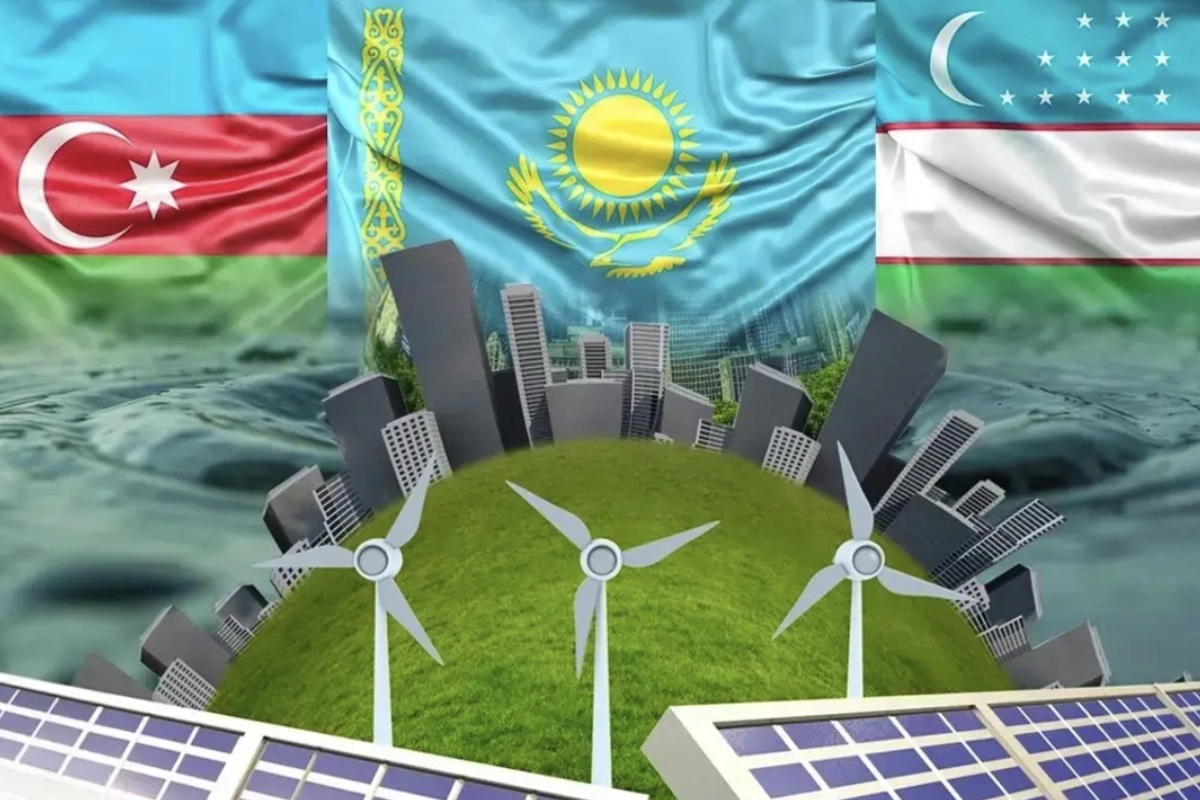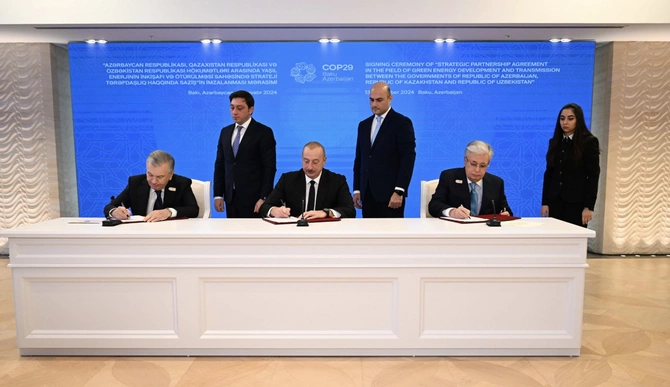
Collage credit: Kazinform/ Freepik
Regional cooperation in green energy between Kazakhstan, Azerbaijan, and Uzbekistan marks a significant step towards sustainable development and environmental security. The signing of the Strategic Partnership Agreement on Green Energy Production and Transmission during the COP 29 World Climate Summit, held in Baku in November 2024, became a milestone for all three nations. The heads of state - Kassym-Jomart Tokayev, Ilham Aliyev, and Shavkat Mirziyoyev - demonstrated unity in their commitment to developing environmentally friendly technologies while ensuring the region’s energy security.
Azerbaijan’s President Ilham Aliyev emphasized that the agreement elevates the fraternal relations among the nations to a qualitatively new level. This initiative serves as an example of harmonizing economic interests with environmental obligations, which is particularly relevant in the era of accelerating climate change.
The agreement provides a framework for the joint development of coordinated policies and the creation of institutional and regulatory mechanisms necessary for integrating renewable energy sources into regional energy grids. This initiative, in turn, strengthens the energy security of participating countries while fostering the development of cross-border energy corridors.

Photo: akorda.kz
A Green Bridge Between Central Asia and Europe
One of the key elements of this partnership is the development of infrastructure to transmit environmentally friendly energy to international markets. Kazakhstan, with its vast territory and strategic location, serves as a critical transit hub for such deliveries. The formation of the so-called "Middle Corridor" as a "green bridge" connecting Central Asia, the South Caucasus, and Europe opens new horizons for the participating countries.
The practical implementation of this corridor entails the construction of modern energy facilities, power transmission lines, and other infrastructure elements that will ensure stable deliveries of renewable energy beyond the region. With such an approach, Kazakhstan, Azerbaijan, and Uzbekistan can position themselves as leaders in promoting green energy on the global stage, delivering energy generated from wind, solar, and other clean sources.
Innovation and Knowledge Sharing
Collaboration in green energy creates opportunities for knowledge sharing and the exchange of advanced technologies. For instance, Kazakhstan is actively developing solar and wind power plants, while Uzbekistan is implementing projects related to hydropower and solar panels. Azerbaijan, on the other hand, focuses on developing offshore wind farms in the Caspian Sea.
This exchange not only bolsters the region’s energy security but also contributes to job creation, local technological development, and increased investment in the green economy. These efforts represent a significant step towards achieving the United Nations’ Sustainable Development Goals.
Azerbaijan’s Role in the Region’s Green Transition
Azerbaijan, with its considerable natural resources, is actively advancing renewable energy projects. Within the framework of its national climate strategy, the country aims to reduce greenhouse gas emissions by 40% by 2050. By 2030, Azerbaijan plans to increase the share of renewable energy sources in its energy balance to 30%.
To achieve these goals, Azerbaijan is forging partnerships with international organizations and investors. For example, the construction of a 240 MW wind power plant, implemented in collaboration with the Saudi company ACWA Power, has become one of the largest projects in the region. Additionally, Azerbaijan continues to strengthen its position as an energy hub between Europe and Asia, making it a key player in the global green transition.
Global Significance of the Partnership
The cooperation among Kazakhstan, Azerbaijan, and Uzbekistan in green energy holds significant global importance. It demonstrates that, despite differences in economic and natural resources, countries can unite to achieve common environmental goals.
The participation of these states in the global climate agenda underscores that Central Asia and the South Caucasus are ready to play an active role in shaping the future of energy. The signing of this strategic agreement is only the beginning of a long journey that will require substantial investment and coordinated efforts to achieve a sustainable energy future.
Moreover, such initiatives inspire other regions to join forces in combating climate change. The experience of Kazakhstan, Azerbaijan, and Uzbekistan can serve as a model for countries seeking to simultaneously enhance energy security, reduce emissions, and promote green technologies.
The Strategic Partnership in Green Energy between Kazakhstan, Azerbaijan, and Uzbekistan is more than just an agreement on joint actions. It is a new model of international cooperation based on respect for nature, the rational use of resources, and mutual benefit. In the face of growing challenges posed by climate change, such initiatives are becoming increasingly relevant and necessary.
This regional alliance for advancing green energy serves as an example of how countries can unite to address global problems, creating a platform for sustainable development and strengthening ties between nations.
Share on social media